- Home
- Ken Follett
Code to Zero (2000) Page 11
Code to Zero (2000) Read online
Page 11
'That'll be the psychology section,' she said. 'If you like to follow me, I'll show you where it is.' She led him up a grand staircase to the next floor and pointed to a corner.
Luke looked along the shelf. There were plenty of books on psychoanalysis, child development, and perception, none of which were any use. He picked out a fat tome called The Human Brain and browsed through it, but there was not much about memory, and what there was seemed highly technical. There were some equations, and a certain amount of statistical material, which he found easy enough to understand; but much of the rest assumed a knowledge of human biology he did not have.
His eye was caught by An Introduction to the Psychology of Memory by Bilhah Josephson. That sounded more promising. He pulled it out and found a chapter on disorders of the memory. He read:
The common condition in which the patient 'loses his memory' is known as 'global amnesia'.
Luke was elated. He was not the only person to whom this had happened.
Such a patient does not know his identity and will not recognize his own parents or children. However, he remembers a great deal else. He may be able to drive a car, speak-foreign languages, strip down an engine, and name the Prime Minister of Canada. The condition would be more appropriately called 'autobiographical amnesia'.
This was exactly what had happened to him. He could still check whether he was being tailed and start a stolen car without the key.
Dr Josephson went on to outline her theory that the brain contained several different memory banks, like separate filing cabinets, for different kinds of information.
The autobiographical memory records events we have experienced personally. These are labeled with time and place: we generally know not only what happened, but when and where.
The long-term semantic memory holds general knowledge such as the capital of Romania and how to solve quadratic equations.
The short-term memory is where we keep a phone number for the few seconds in between looking it up in the phone book and dialing it.
She gave examples of patients who had lost one filing cabinet but retained others, as Luke had. He felt profound relief, and gratitude to the author of the book, as he realized that what had happened to him was a well-studied psychological phenomenon.
Then he was struck by an inspiration. He was in his thirties, so he must have followed some occupation for a decade. His professional knowledge should still be in his head, lodged in his long-term semantic memory. He ought to be able to use it to figure out what line of work he did. And that would be the beginning of discovering his identity!
Looking up from the book, he tried to think what special knowledge he had. He did not count the skills of a secret agent, for he had already decided, judging by his soft indoor skin, that he was not a cop of any kind. What other special knowledge did he have?
It was maddeningly difficult to tell. Accessing the memory was not like opening the refrigerator, where you could see the contents at a glance. It was more like using a library catalogue - you had to know what you were looking for. He felt frustrated, and told himself to be patient and think this through.
If he were a lawyer, would he be able to remember thousands of laws? If a doctor, should he be able to look at someone and say: 'She has appendicitis'?
This was not going to work. Thinking back over the last few minutes, the only clue he noticed was that he had easily understood the equations and statistics in The Human Brain, even though he had been puzzled by other aspects of psychology. Maybe he was in a profession that involved numbers: accountancy or insurance, perhaps. Or he might be a math teacher.
He found the math section and looked along the shelves. A' book called Number Theory caught his attention. He browsed through it for a while. It was clearly presented, but some years out of date...
Suddenly he looked up. He had discovered something. He understood number theory.
That was a major clue. Most pages of the book in his hand contained more equations than plain text This was not written for the curious layman. It was an academic work. And he understood it He had to be some kind of scientist With mounting optimism, he located the chemistry shelf and picked out Polymer Engineering. He found it comprehensible, but not easy. Next he moved to physics and tried A Symposium on the Behaviour of Cold and Very Cold Gases. It was fascinating, like reading a good novel.
He was narrowing it down. His job involved math and physics. What branch of physics? Cold gases were interesting, but he did not feel that he knew as much as the author of the book. He scanned the shelves and stopped at geophysics, remembering the newspaper story headlined U. S. MOON STAYS EARTHBOUND. He picked out Principles of Rocket Design.
It was an elementary text, but nevertheless there was an error on the first page he looked at Reading on, he found two more--
Yes!' he said aloud, startling a nearby schoolboy who was studying a biology text If he could recognize mistakes in a textbook, he had to be an expert He was a rocket scientist He wondered how many rocket scientists there were in the United States. He guessed a few hundred. He hurried to the information desk and spoke to the grey-haired librarian. 'Is there any kind of list of scientists?'
'Sure,' she said. 'You need the Dictionary of American Scientists, right at the beginning of the science section.'
He found it easily. It was a heavy book, but nevertheless it could not include every single American scientist It must just be the prominent ones, he thought Still, it was worth looking at He sat at a table and went through the index, searching for anyone named Luke. He had to control his impatience and force himself to scan carefully.
He found a biologist called Luke Parfitt, an archaeologist called Lucas Dimittry, and a pharmacologist called Luc Fontainebleu, but no physicist Double-checking, he went through geophysicists and astronomers, but found no one with any version of Luke as a first name. Of course, he thought despondently, he was not even certain that Luke was his name. It was only what he had been called by Pete; For al he knew, his real name might be Percival.
He felt disappointed, but he was not ready to give up.
He thought of another approach. Somewhere, there were people who knew him. The name Luke might not be his own, but his face was. The Dictionary of American Scientists carried photos of only the most prominent men, such as Dr Wemher von Braun. But Luke figured he must have friends and colleagues who would recognize him, if only he could find them. And now he knew where to start looking - for some of his acquaintances must be rocket scientists.
Where did one find scientists? At a university.
He looked up Washington, DC in the encyclopedia. The entry included a list of universities in the city. He picked Georgetown University because he had been in Georgetown earlier and knew how to get back there. He looked for the university on his street map, and saw that it had a large campus covering at least fifty city blocks. It would probably have a big physics department with dozens of professors. Surely one of them would know him?
Full of hope, he left the library and got back into his car.
.
2.30 P. M.
The igniters were not originally designed to be fired in a vacuum.' For the Jupiter rocket, they have been redesigned so that: (i) the entire motor is sealed in an airtight container; (ii) in case that container should be breached, the igniter itself is also in a sealed container; and (in) the igniter should fire in a vacuum anyway. This multiple fail-safe is an application of a design principle known as 'redundancy'.
The Cuba meeting took a coffee break, and Anthony ran back to Q Building for an update, praying his team would have come up with something, any clue to Luke's whereabouts.
Pete met him on the stairs. 'Here's something weird,' he said.
Anthony's heart jumped with hope. 'Give!'
'A report from the police in Georgetown. A housewife comes back from the store to find that her home has been broken into and her shower has been used. The intruder has disappeared, leaving behind a suitcase and a pile of filt
hy old clothes.'
Anthony was electrified. 'At last - a break!' he said. 'Give me the address.'
You think this is our guy?'
'I'm sure of it! He's fed up with looking like a bum, so he's broken into an empty house, showered, shaved, and put on some decent clothes. That's characteristic, he would hate to be badly dressed.'
Pete looked thoughtful. 'You know him pretty well, I guess.'
Anthony realized he had slipped again. 'No, I don't,' he snapped. 'I read his file.'
'Sorry,' Pete said. After a moment he went on: T wonder why he left stuff behind?'
'My guess is, the housewife came home before he was quite finished.'
'What about the Cuba meeting?'
Anthony stopped, a passing secretary. 'Please call the conference room in P Building and tell Mr. Hobart that I was taken ill with stomach pains and Mr. Maxell had to drive me home.'
'Stomach pains,' she said, deadpan.
'Right,' he said, walking away. Over his shoulder he called: 'Unless you can think of something better.'
He left the building with Pete following, and they jumped into his old yellow Cadillac. 'This may need delicate handling,' he said to Pete as he headed for Georgetown. 'The good news is that Luke has left us some clues. Our problem is that we don't have a hundred men to chase up leads. So, my plan is to get the Washington Police Department working for us.'
'Good luck,' Pete said skeptically. 'What should I do?' .
'Be nice to the cops, and leave the talking to me.'
'I believe I can handle that.'
Anthony drove fast and quickly found the address in the police report. It was a small one Family home on a quiet street. A police cruiser was parked outside.
Before going into the house, Anthony studied the opposite side of the street, scrutinizing the houses. After a moment he spotted what he was looking for: a face in an upstairs window, watching him. It was an elderly woman, with white hair. She did not step back from the window when she caught his eye, but returned his stare with unabashed curiosity. She was just what he needed, a neighbourhood busybody. He smiled and gave her a salute, and she inclined her head in acknowledgement He turned away and approached the house that had been broken into. He could see scratches and a little splintering on the door jamb where the lock had been forced; a neat, professional job with no unnecessary damage, he thought That fitted Luke.
The door was opened by an attractive young woman who was expecting a baby - pretty soon, he guessed. She took Anthony and Pete into her living room where two men were sitting on the couch, drinking coffee and smoking. One was a uniformed patrolman. The other, a young man in a cheap sharkskin suit, was probably a detective. In front of them was a splayed-leg coffee table with a red Formica top. An open suitcase was on the table.
Anthony introduced himself. He showed his identification to the cops. He did not want Mrs. Bonetti - and all her friends and neighbours - to know that the CIA was interested in the case, so he said: 'We're colleagues of these police officers.'
The detective was Lewis Hite. You know something about this?' he said guardedly.
'I think we may have some information that will help you. But first, I need to know what you've got'
Hite spread his hands in a gesture of bafflement 'We got a suitcase belongs to a guy named Rowley Anstruther, Junior, from New York. He breaks into Mrs. Bonetti's house, takes a shower, and goes away, leaving his suitcase behind. Go figure!'
Anthony studied the case. It was a good-quality tan leather, bag, less than half full. He looked through the contents. There were clean shirts and underwear, but no shoes, pants or jackets.
'Looks like Mr. Anstruther arrived in Washington from New York today,' he said.
Hite nodded, but Mrs. Bonetti said admiringly: 'How do you know that?'
Anthony smiled. 'Detective Hite will tell you.' He did not want to offend Hite by stealing his limelight 'The bag contains clean underwear but no laundry,' Hite explained. 'The guy hasn't changed his clothes, so he probably hasn't yet spent a night away. That means he left home this morning.'
Anthony said: 'I believe some old clothes were also left behind.'
The patrolman, whose name was Lonnie, said: 'I got 'em.' He lifted a cardboard box from beside the couch. 'Raincoat,' he said, sorting through the contents, 'Shirt, pants, shoes.'
Anthony recognized them. They were the rags Luke had been wearing. 'I don't believe Mr. Anstruther came to this house,' Anthony said. 'I think the bag was stolen from him this morning, probably at Union Station.' He looked at the patrolman. 'Lonnie, would you call the precinct nearest the railroad station and ask if such a theft has been reported? That's if Mrs. Bonetti will permit us to use the phone.'
'Of course,' she said. 'It's in the hall.'
Anthony added: 'The theft report should fit the contents of the bag. I believe you'll find they include a suit and a pair of shoes that are not here now.' They were all staring at him in astonishment 'Please make a careful note of the description of the suit'
'Okay.' The patrolman went into the hallway.
Anthony felt good. He had managed to take command of the investigation without offending the police. Detective Hite now looked at him as if waiting for instructions. 'Mr. Anstruther must be a man of six foot one or two, about 180 pounds, athletic build, he said. 'Lewis, if you check the size of those shirts, you'll probably find they're sixteen neck, thirty-five sleeve.'
'They are already checked,' Hite said.
'I should have known you'd be ahead of me.' Anthony flattered him with a wry smile. 'We have a picture of the man we believe stole the suitcase and broke into this house.' Anthony nodded to Pete, who handed Hite a sheaf of photographs. 'We don't have a name for him,' Anthony lied. 'He's six foot one, 180 pounds, athletic build, and he may pretend to have lost his memory.'
'So what's the story?' Hite was intrigued. 'This guy wanted Anstruther's clothes, and he came here to change?'
'Something like that.'
'But why?'
Anthony looked apologetic. 'I'm sorry, I can't tell you.'
Hite was pleased. 'Classified, huh? No problem.'
Lonnie came back. 'Dead right about the theft Union Station, eleven-thirty this morning.'
Anthony nodded. He had impressed the hell out of the two cops. 'And the suit?'
'Navy blue, with a chalk stripe.'
He turned to the detective. 'So, you can put out a photo and description including the clothes he's wearing.'
You think he's still in town.'
Yes.' Anthony was not as sure as he pretended, but he could not think of any reason for Luke to leave Washington.
'I presume he's in a car.'
'Let's find out' Anthony turned to Mrs. Bonetti. 'What's the name of the white-haired lady who lives across the street, a couple of doors down?'
'Rosemary Sims.'
'She spends a lot of time looking out her window?'
'We call her Nosy Rosie.'
'Excellent.' He turned to the detective. 'Shall we have a word with her?'
'Yep.'
They crossed the street and knocked on Mrs. Sims's door. She opened it instantly - she had been waiting in the hall. 'I saw him!' she said immediately. 'He went in there looking like a bum, and came out dressed to the nines!'
Anthony made a gesture indicating that Hite should ask the questions. Hite said: 'Did he have a car, Mrs. Sims?'
'Yes, a nice little blue-and-white model. I thought it didn't belong to anyone in this street.' She looked at them slyly. 'I know what you're going to ask me next.'
'Did you happen to notice the license plate?' Hite asked.
Yes,' she said triumphantly. 'I wrote it down.'
Anthony smiled.
.
3 P. M.
The upper stages of the missile art contained in an aluminum tub with a cast magnesium base. The upper-stage tub rests on bearings, allowing it to spin during flight. 'It will rotate at about 550 revolutions per minute to improve accuracy.
On 37th Street at the end of O Street, the iron gates of Georgetown University stood open. Around three sides of a muddy lawn were Gothic buildings of rusticated grey stone, and students and faculty hurried from one building to another in their cold-weather coats. As Luke drove slowly in, he imagined that someone might catch his eye, recognize him, and say. 'Hey, Luke! Over here!' And the nightmare would be over. '
Many of the professors wore clerical collars, and Luke realized this must be a Catholic university. It also appeared to be all-male.
He wondered whether he was Catholic.
He parked in front of the main entrance, a triple-arched portico marked 'Healy Hall'. Inside he found a reception desk and the first woman he had seen here. She said that the physics department was directly below where he stood, and told him to go outside and turn down a flight of steps that led beneath the portico. He felt he was coming nearer to the heart of the mystery, like, a treasure hunter penetrating the chambers in an Egyptian pyramid.
Following her directions, he found a large laboratory with benches down the centre and doors on either side that led to smaller offices. At one of the benches, a group of men were working with the components of a microwave spectrograph. They all wore eyeglasses. Judging by their ages, Luke thought they were professors and graduate students. Some of them might easily be people he knew. He approached them with an expectant look.
One of the older men caught his eye, but there was no flash of recognition. 'Can I help you?'
'I hope so,' Luke said. 'Is there a department of geophysics here?'
'Goodness, no,' he said. 'At this university, even physics is considered a minor subject' The others laughed.
Luke gave them all a chance to look at him, but none seemed, to know him. He had chosen badly, he thought despondently; he probably should have gone to George Washington University. 'What about astronomy?'
'Why, yes, of course. The heavens, we study. Our observatory is famous.'
His spirits lifted. 'Where is it?'
The man pointed to a door at the back of the lab. 'Go to the other end of this building and you'll see it on the far side of the baseball diamond.' He returned his attention to the bench.

 The Pillars of the Earth
The Pillars of the Earth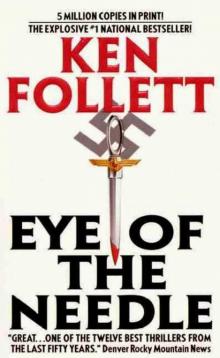 Eye Of The Needle
Eye Of The Needle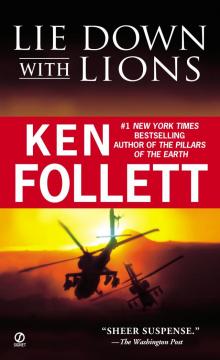 Lie Down With Lions
Lie Down With Lions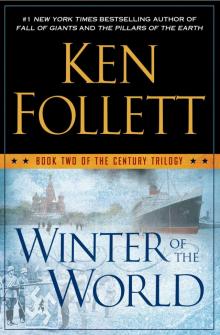 Winter of the World
Winter of the World Triple
Triple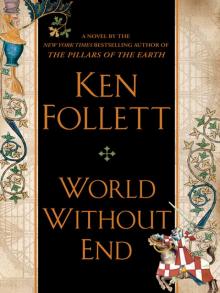 World Without End
World Without End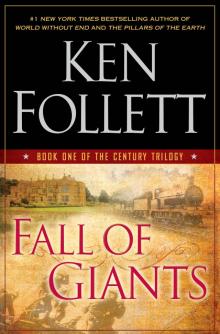 Fall of Giants
Fall of Giants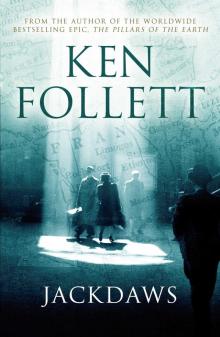 Jackdaws
Jackdaws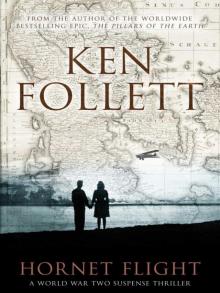 Hornet Flight
Hornet Flight Whiteout
Whiteout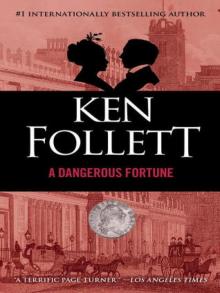 A Dangerous Fortune
A Dangerous Fortune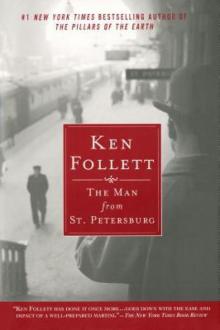 The Man From St. Petersburg
The Man From St. Petersburg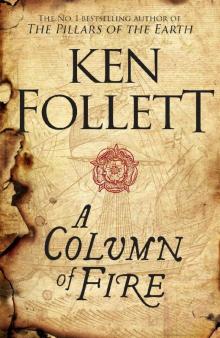 A Column of Fire
A Column of Fire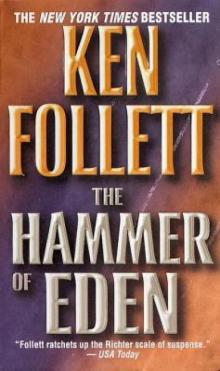 The Hammer of Eden
The Hammer of Eden On Wings of Eagles
On Wings of Eagles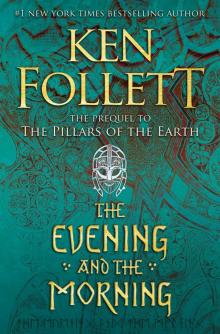 The Evening and the Morning
The Evening and the Morning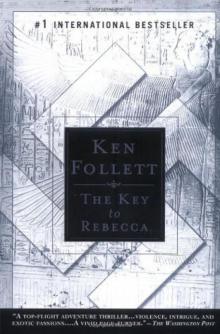 The Key to Rebecca
The Key to Rebecca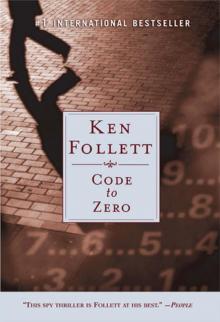 Code to Zero
Code to Zero Paper Money
Paper Money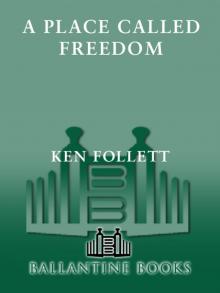 A Place Called Freedom
A Place Called Freedom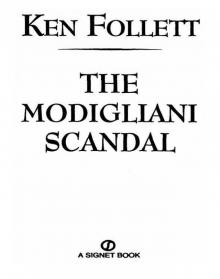 The Modigliani Scandal
The Modigliani Scandal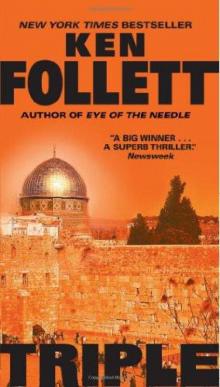 Triple (1991)
Triple (1991)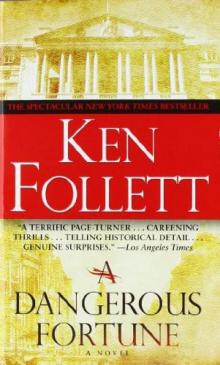 A Dangerous Fortune (1994)
A Dangerous Fortune (1994)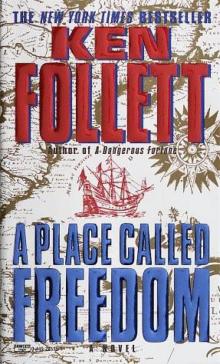 A Place Called Freedom (1995)
A Place Called Freedom (1995)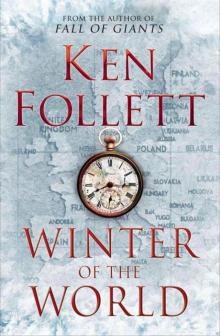 Winter of the World (Century Trilogy 2)
Winter of the World (Century Trilogy 2)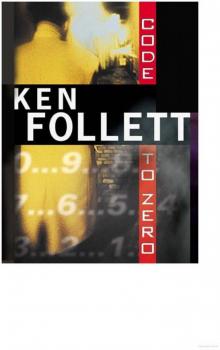 Code to Zero (2000)
Code to Zero (2000) On Wings Of Eagles (1990)
On Wings Of Eagles (1990) Storm Island
Storm Island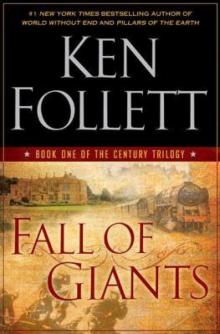 Fall of Giants (The Century Trilogy)
Fall of Giants (The Century Trilogy)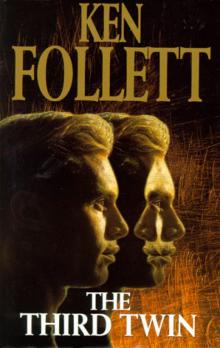 the Third Twin (1996)
the Third Twin (1996)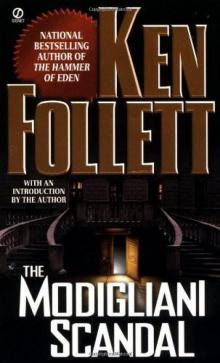 The Modigliani Scandal (1976)
The Modigliani Scandal (1976)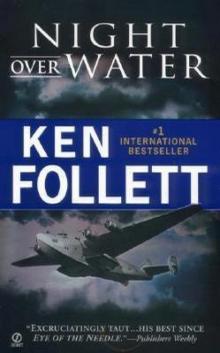 Night Over Water
Night Over Water